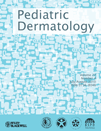Symptomatic Acquired Zinc Deficiency in At-Risk Premature Infants: High Dose Preventive Supplementation Is Necessary
Abstract
Abstract: Zinc is a cofactor for several enzymes involved in many metabolisms. Zinc deficiency induces various disorders such as acrodermatitis enteropathica, either inherited or acquired. We report three cases of premature infants (24–31 wks gestational age) with low birthweight (650 to 940 g) and enteropathy, two of whom presented with necrotizing enterocolitis. All infants were fed by total parenteral nutrition. At a chronological age ranging from 73 to 80 days, all infants developed a periorificial dermatitis. Before the onset of the first signs, they had received zinc supplementation ranging from 146% to 195% of the recommended dose (400 μg/kg/day). Increased zinc supplementation over a course of 6–18 days induced a complete resolution of symptoms in all cases. No abnormality in the neurologic examination and no recurrence were observed at the end of the zinc treatment. Low birthweight premature infants with enteropathy on total parenteral nutrition are at risk of developing zinc deficiency. The usual recommended zinc supplementation is probably insufficient for those infants. A delay in the diagnosis of zinc deficiency may lead to severe complications.




